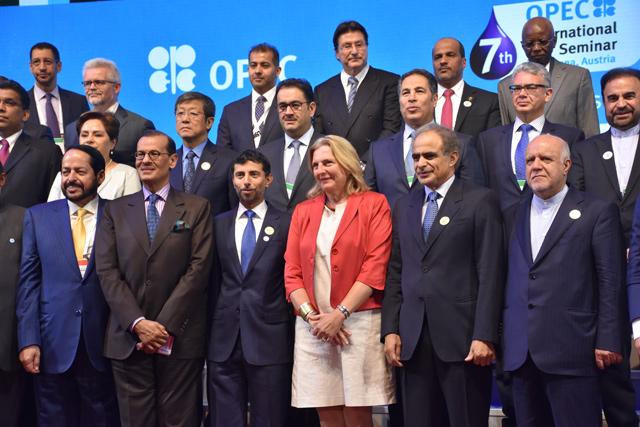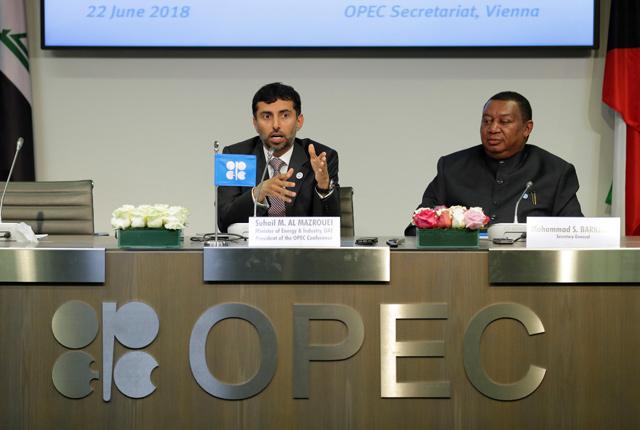You are here
OPEC to decide on output policy on Friday
By Thomson Reuters Foundation - Jun 20,2018 - Last updated at Jun 20,2018

Participants pose for a family photo during 7th Organisation of Petroleum Exporting Countries International Seminar in Vienna, Austria, on Wednesday (Reuters photo)
VIENNA — The Organisation of the Petroleum Exporting Countries (OPEC) cartel meets on Friday to decide output policy amid calls from major consumers such as the United States and China to cool down oil prices and support the global economy by producing more crude.
Iran signalled on Wednesday it could compromise on a small increase in the Organisation of the Petroleum Exporting Countries (OPEC) oil output when the group meets this week.
In tandem, Saudi Arabia scrambled to convince fellow members of the need for a larger rise in production.
On Tuesday, Iran said OPEC was unlikely to reach a deal, setting the stage for a clash with kingpin Saudi Arabia and non-member Russia, which are pushing to raise production steeply from July to meet growing global demand.
But on Wednesday, Iranian Oil Minister Bijan Zanganeh said OPEC members that had overdelivered on cuts in recent months should comply with agreed quotas.
That would effectively mean a modest boost from producers such as Saudi Arabia that have been cutting more deeply than planned despite production outages in Venezuela and Libya.
"OPEC could keep the same deal with compliance going back to 100 per cent," said an OPEC source who is aware of Iran's stance.
OPEC Secretar General Mohammad Barkindo said he was confident there would be a deal when the producer group meets in Vienna on Friday.
Russia has proposed OPEC and non-OPEC producers raise output by 1.5 million barrels per day (bpd), effectively wiping out existing production cuts of 1.8 million bpd that have helped rebalance the market in the past 18 months and lifted oil to $75 per barrel. Oil traded as low as $27 in 2016.
Saudi Energy Minister Khalid Al Falih also said on Wednesday that the market demanded more oil in the second half of this year and that OPEC was moving towards "a good decision".
Ecuador said OPEC and its allies could agree to a compromise increase in output of around 0.5-0.6 million bpd.
A decision to increase output could be taken even with Iran refusing to sign up, as has happened before in OPEC.
Addressing over-compliance
Iran has so far been the main barrier to a deal, with Zanganeh saying OPEC should not yield to pressure from US President Donald Trump to raise output.
He said Trump had contributed to the rise in prices by imposing sanctions on OPEC members Iran and Venezuela, which will likely lead to lower exports.
Zanganeh said he would leave Vienna on Friday even before OPEC holds talks with non-OPEC producers the next day, but efforts were underway on Wednesday to convince Iran to participate in a deal.
Sources said Saudi Arabia did not want to be seen as putting too much pressure on Iran and hence Russia was instead trying to convince Tehran.
Zanganeh was due to attend a ministerial committee on Thursday, two sources said. Iran is usually not part of the committee, which includes Russia, Saudi Arabia, the United Arab Emirates, Oman, Kuwait, Algeria and Venezuela.
Iraq and Venezuela have also opposed a relaxation of production cuts, fearing a slump in prices.
Iraqi Oil Minister Jabar Al Luaibi said on Wednesday he hoped there would be agreement when OPEC meets but added: "The oil market has not reached the level of stabilisation".
Gulf producers usually aligned with Saudi Arabia — the UAE, Kuwait, Oman and Bahrain — have also cautioned against a large output increase and signalled they have been rattled by Riyadh's close coordination with Russia, sources have said.
Gulf oil producers' views still differed on Wednesday on how much to increase production and whether such a move should be gradual, sources said.
Nevertheless, they tried to bring Iran on board for a deal, with ministers from the UAE, Kuwait and Oman meeting Zanganeh on Wednesday.
Oman's oil minister, Mohammed Bin Hamad Al Rumhy, said he believed Iran would agree to an output increase on Friday. He said the meeting would tackle over-compliance with oil output cuts and that Iran was "very cooperative".
Related Articles
ANKARA/DUBAI — Iran on Wednesday stopped short of offering to restrain oil output as part of a global pact to freeze production to prop up p
VIENNA — The Organisation of the Petroleum Exporting Countries (OPEC) agreed with Russia and other oil-producing allies on Saturday to raise
TEHRAN — Iranian President Hassan Rouhani called Sunday for national unity to liberate the economy from international sanctions, which he co













